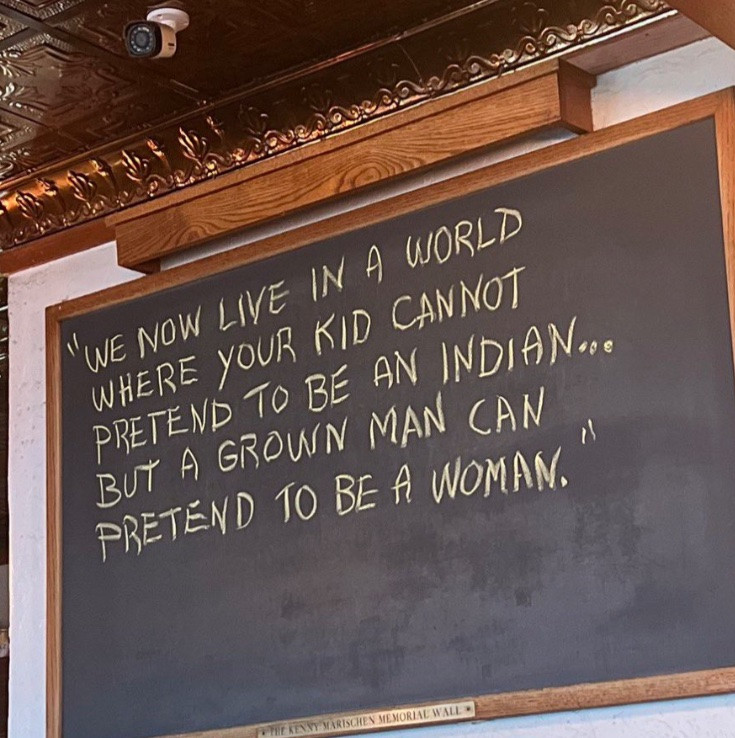F Street Station, a well-known bar in downtown Anchorage, Alaska, has recently found itself at the center of a heated debate regarding free speech after a message posted on its chalkboard sparked online controversy.
The message, displayed prominently for patrons and passersby, read: “We now live in a world where your kid cannot pretend to be an Indian … But a grown man can pretend to be a woman.” This statement, touching on sensitive issues of cultural appropriation and gender identity, ignited a firestorm on social media platforms.
 Chalkboard sign at F Street Station in Anchorage stating controversial opinion
Chalkboard sign at F Street Station in Anchorage stating controversial opinion
Following the posting of this message, a wave of criticism and calls for boycott emerged online. Social media users, identifying as “radical leftists” in the original article, accused the bar of being transphobic and racist. Organized campaigns urged individuals to take action against the establishment, with one online call to action stating, “Allies, time to do your thing,” accompanied by the bar’s phone number. Another comment expressed a sentiment of disgust and urged employees to quit if they did not share the bar’s views, reflecting the strong emotional reactions the message provoked.
The backlash extended beyond social media commentary. Yelp, a popular review platform, was forced to temporarily disable reviews for F Street Station due to an influx of negative and often fabricated reviews. Many of these reviews, likely from individuals who had never visited the bar, criticized aspects like food quality, such as reuben sandwiches and French onion soup, in an apparent attempt to damage the bar’s online reputation.
TripAdvisor, another prominent review site, followed suit, suspending new reviews for F Street Station. Despite maintaining a four-star rating based on nearly 1,000 genuine reviews, TripAdvisor cited a “recent event that has attracted media attention” and an influx of reviews lacking “first-hand experience” as the reason for their action. This widespread online reaction highlights the intensity of public discourse surrounding the bar’s message.
Even figures from the Alaskan political scene weighed in on the controversy. Former gubernatorial candidate Les Gara publicly called for the bar to issue a sincere apology, further amplifying the pressure on F Street Station.
However, amidst the online storm, F Street Station also garnered support, particularly from its loyal customer base and those who champion free speech. The original article points to a 2015 review by now-Rep. Zack Fields in the Anchorage Press, praising the bar’s enduring quality and atmosphere. Fields lauded F Street Station as an “often-packed establishment” and a “privilege” in a city with many “mediocre and overpriced restaurants.” He specifically highlighted the “unpretentious and impeccable” food, mentioning standouts like the roast beef sandwiches and Friday French dip lunches, which he declared “the best I’ve eaten in Anchorage or anywhere else.” His detailed and enthusiastic review underscores the bar’s long-standing reputation for culinary excellence and consistent quality.
Fields’ review further emphasized the bar’s unpretentious nature and focus on quality over trends, noting its lack of a website or Facebook page, relying instead on word-of-mouth and consistent customer satisfaction. This enduring appeal suggests that F Street Station’s value extends beyond fleeting online opinions.
The situation at F Street Station raises broader questions about the limits of free speech, the impact of social media activism, and the balance between expressing potentially controversial opinions and maintaining a welcoming community space. While the online backlash was significant, the bar’s history and local support suggest that F Street Station remains a fixture in Anchorage, navigating the complexities of contemporary public discourse while continuing to serve its loyal patrons.
F Street Station’s story is a microcosm of larger societal debates, playing out in a local Anchorage setting, where a simple chalkboard message ignited a national conversation about culture, identity, and the boundaries of free expression in the digital age.

